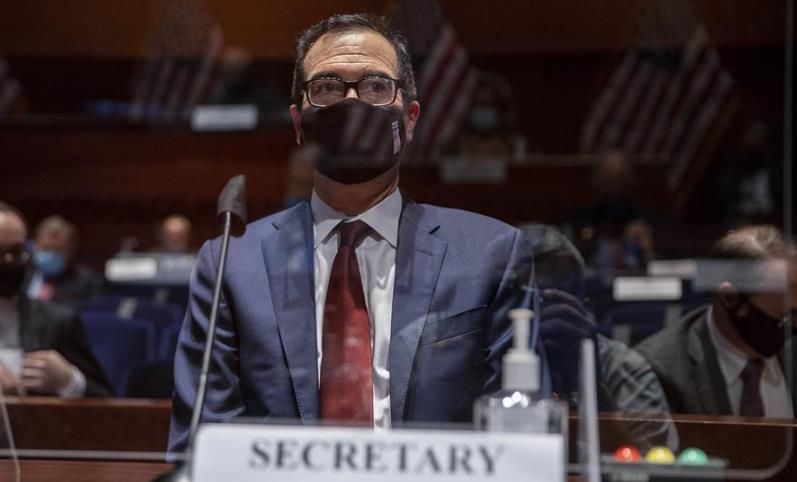
WASHINGTON, June 30 (Xinhua) -- U.S. Treasury Secretary Steven Mnuchin and Federal Reserve Chairman Jerome Powell on Tuesday offered congressional lawmakers different views on how quickly the U.S. economy would recover from the COVID-19 pandemic amid the resurgence in cases in a number of states.
"We are in a strong position to recover because the Administration working with Congress on a bipartisan basis to pass legislation and provide liquidity to markets in record time," Mnuchin said at a hearing held by the House Financial Services Committee.
"While the unemployment rate is still historically high, we are seeing additional signs that conditions will improve significantly in the third and fourth quarters of this year," he said, adding the recovery has been uneven across industries.
"Certain industries such as construction are recovering quickly, while others such as retail and travel are facing longer impacts and may require additional relief," said the treasury secretary.
Acknowledging that recent economic data offer some positive signs, Powell warned that the sooner-than-expected reopening of the U.S. economy has brought "new challenges" for the country.
"While this bounce back in economic activity is welcome, it also presents new challenges, notably the need to keep the virus in check," Powell said at the same hearing, adding the path forward for the economy remains "extraordinarily uncertain" and will depend in large part on the success in containing the virus.
"A full recovery is unlikely to occur until people are confident that it's safe to engage in a broad range of activities. The path forward will also depend on policy actions taken at all levels of government to provide relief and support the recovery for as long as needed," he said.
The Fed chief also warned that a second outbreak of the virus could force governments and people to "withdraw again from economic activity."
"I think the worst part of it would be to undermine the public confidence, which is what we need to get back to lots of kinds of economic activity that involves crowds," said Powell.
More than 2.6 million COVID-19 cases have been reported in the United States with the fatalities surpassing 127,000 as of Tuesday afternoon, according to a tally by Johns Hopkins University.
Anthony Fauci, director of the National Institute of Allergy and Infectious Diseases, said Tuesday that COVID-19 cases in the United States could go up to 100,000 per day if the current trend "does not turn around."
The outbreaks in various parts of the country put "the entire country at risk" and "clearly we don't have this under control," Fauci said at a Senate hearing.
U.S. Secretary of Health and Human Services Alex Azar also said on Sunday that the "window is closing" for the country to curb the surge of COVID-19 cases.
Many U.S. states have either paused or partially reversed their staged reopening of the economy after reporting record increases in coronavirus infections and hospitalizations.
The U.S. economy contracted at an annual rate of 5 percent in the first quarter of this year, according to the Commerce Department. That figure, however, still does not fully capture COVID-19's economic damage, and many analysts believe that the contraction in the second quarter is expected to be much deeper.
Powell has consistently urged Congress to consider further fiscal aid to households, companies, and state and local governments to prevent the recession from causing long-term damage to the economy.
Mnuchin said Tuesday that the administration looks forward to working with Congress in July on additional relief legislation to help certain industries weather the pandemic.
"We would anticipate that any additional relief would be targeting to certain industries that have been especially hard hit by the pandemic, with a focus on jobs and putting all Americans back to work who have lost their jobs through no fault of their own," he said.
"Lawmakers are expected to settle on another fiscal rescue package in the next few weeks, and the price tag should be getting bigger with the new infections," Mark Zandi, chief economist of Moody's Analytics, wrote Monday in an analysis. "If they fail, the economy will almost surely contract again this fall."



















Latest comments